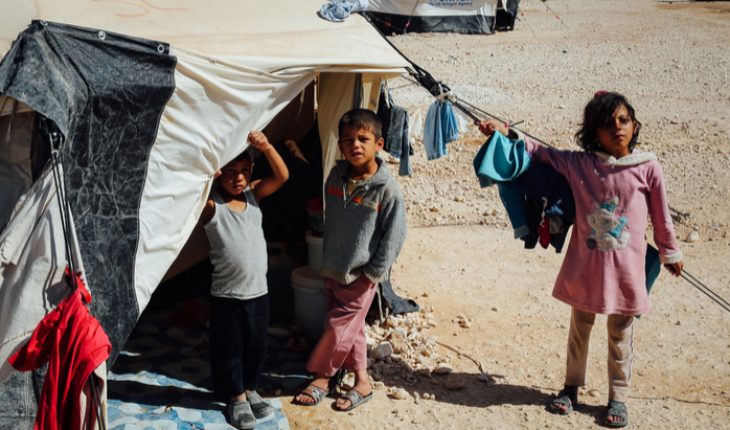Mike Thomson is a doctor from the UK, currently working in Irbid, Jordan, at a Medecins Sans Frontieres project which focuses on refugee health for those with chronic illnesses. Here he blogs about taking up a new role, as the mental health lead for the project.
‘Mental health provision was not part of the original Irbid non-communicable diseases project. Though depression and anxiety are chronic diseases in their own right, this is not reason on its own for patients with these conditions to be able to join the project for treatment. They also have to have one of the following; diabetes, cardiovascular disease, asthma, COPD or uncontrolled and damaging hypertension. But mental health or psychosocial care has been in the project for quite a while.
Not long before I arrived, the decision had been made that we would start to screen people for depression using a questionnaire that is commonly used in UK (the PHQ9).We started to identify more and more people who have depression, and found that many of them identified as having suicidal thoughts.
Not long before I arrived, the decision had been made that we would start to screen people for depression using a questionnaire that is commonly used in UK (the PHQ9).We started to identify more and more people who have depression, and found that many of them identified as having suicidal thoughts.
There has been growing pressure on the small team of three mental health counsellors to see people who now some time ago said that they were suicidal and so, with the agreement of my line manager, I have tried over the last few weeks to take the role as Mental Health Lead using my longstanding interest in depression and anxiety.
It has been great to learn more about the counselling team and their lives. They have wonderfully different styles, one is more diffident and can appear more uncertain, another is very much more upfront and direct, whilst the third is normally very smart and wonderfully dapper.
The counsellors all share a wonderful commitment to their patients and to trying to enable them to move forwards. I’ve not seen them counsel of course, but their descriptions of interactions have been largely consistent with external appearances. Listening to them they all share a wonderful commitment to their patients and to trying to enable them to move forwards.
Like so many of my Jordanian colleagues their levels of higher education are stunning so it should have been no surprise when one of them asked me for advice on how to frame questions for her PhD and how to integrate this work with our MSF setting.
Recently, because of the backlog of work whilst one of them has been having a well-deserved holiday, we have been joined by another MSF trained counsellor from a nearby project which is closing (fewer severely war wounded coming across the border from Syria means that it is uneconomic to continue to run it pending a change in the war).
It has been wonderful to see the new counsellor’s input to the team, her commitment to the patients and to enabling MSF in a role which she’ll have for only a couple of weeks. It also makes me proud of the support that MSF has offered to help her become such a wonderful counsellor, but at the same time extremely sad that MSF has no more work for this committed person.
When I’ve worked in UK it has often been relatively easy to identify the room that the practice counsellor uses. There are often traces of softness and warmth rather than the bare clinical needs of some GPs rooms. So I probably carried this idea of a counselling room when I joined the team as their (temporary) clinical lead.
Here, however, the counselling team have no space to see patients at one of our two clinics and two rooms which are just about acceptable in the other clinic, though neither would be welcomed by a UK counsellor. But there are three of them and then the only space left is a room which has a toilet on either side (the walls go up a fair way but then the ventilation is into the ‘counselling’ room (and the sounds go both ways too!)
Due to the crisis in numbers of people who may be suicidal we are back using this third space again (though each counsellor only ever does a two hour stretch here per day). Meanwhile we are looking again at whether we can adapt one end of an old container outside as a counselling space… potentially suicidal people need us as an organisation to make challenging choices.
There has always been a different set of assumptions about mental health from physical health in all societies. But these desperate people also have great challenges to make prioritising how to spend the very little cash they have and getting a family member to see somebody who offers a talking cure is culturally low on the list for many of the families. So, appointments have to be fitted in with their medical appointments very often or it is just too difficult to come. One of the questions that the real Mental Health Lead will have to consider is to what extent should we accept this and whether instead we should try to offer more by phone knowing that even for our impoverished refugees almost every family has a mobile phone.
Offering more phone calls would be one way to be more efficient and reach more people in the limited time we have available, though it does not come without its own difficulties as counselling is so much harder without the non-verbal communication cues so this will be a challenging decision.
In an attempt to look at other options I spent a happy few hours mapping the detail of the current processes from the initial screening questions, to the patient actually seeing the mental health counsellor.
As ever simply carefully going through the mapping exercise raised questions for me about alternative processes and ways to shift work to enable a better use of the counsellors’ time. But change will take a while on these areas as it affects many others, so I’m not going to try to rush the process through. Instead I’ll try to get everybody to think about processes and possible changes first, and talk through this pathway with the incoming Mental Health Lead.
There has always been a different set of assumptions about mental health from physical health in all societies.
The people that see our counsellors have the combination of significant chronic health conditions and extreme life circumstances, with massive income difficulties day to day
A very concrete example of this difference is the discussion about whether we should be recording the results of the depression (PHQ9) screening tests in the same place as the other data we collect like pulse, blood pressure and laboratory results. Or should we consider that because it is mental health information it should be totally separate?
(Personally I’d like to be seeing mental health data treated like other data, so that when you look at the quality of diabetic control you also see the risk of depression when this was reviewed).
Possibly the thoughts about how we record mental health data are the result of having a Mental Health Activities Manager who is from a more holistic background, as a primary care doctor, rather than a person more steeped in the traditions of pure mental or physical health? If so, is it a good thing, and should there be more primary care people working for longer in mental health in our projects?
There is good evidence that those who are depressed do less well in managing their heart disease. I wonder as I’ve been thinking about our mental health work whether I’ve missed out the elephant in the room?
The question that is hidden, but we need to think about, is whether we should be offering mental health counselling, independent of other chronic illnesses, in our programme?
There is good evidence that those who are depressed do less well in managing their heart disease and live for shorter times after a heart attack, and that depressed people have worse results when we look at their diabetes.
The evidence on how much impact we can make in general populations on improving the physical outcomes with mental health inputs is slightly less clear, with results showing benefits and some showing no change.
Talking with the counsellors and looking at our statistics it seems that the majority of our work is around depression or anxiety. Our cohort of patients does not include that many who have schizophrenia (I can think of several possible reasons) and post-traumatic stress disorder is not that common as a proposed underlying issue.
However, the people that see our counsellors have the combination of significant chronic health conditions and extreme life circumstances, with massive income difficulties day to day. Helping them to find ways to re-engage with the world positively is, I’d suggest a crucial part of managing the chronic health issues and this is where our great mental health counsellors come in.
- Refugees in Jordan: mental health - 1st March 2018






